Hans Uszkoreit
Computational Linguistics, Universitity of the Saarland, Germany
Fine-grained evaluation of Quality Estimation for Machine translation based on a linguistically-motivated Test Suite
Oct 16, 2019



Abstract:We present an alternative method of evaluating Quality Estimation systems, which is based on a linguistically-motivated Test Suite. We create a test-set consisting of 14 linguistic error categories and we gather for each of them a set of samples with both correct and erroneous translations. Then, we measure the performance of 5 Quality Estimation systems by checking their ability to distinguish between the correct and the erroneous translations. The detailed results are much more informative about the ability of each system. The fact that different Quality Estimation systems perform differently at various phenomena confirms the usefulness of the Test Suite.
Fine-grained evaluation of German-English Machine Translation based on a Test Suite
Oct 16, 2019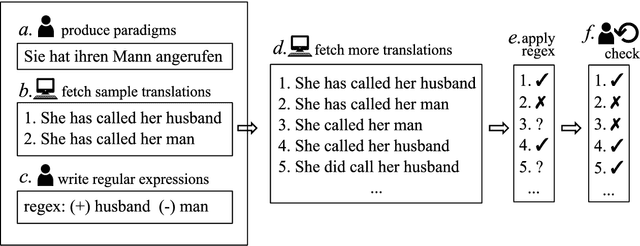
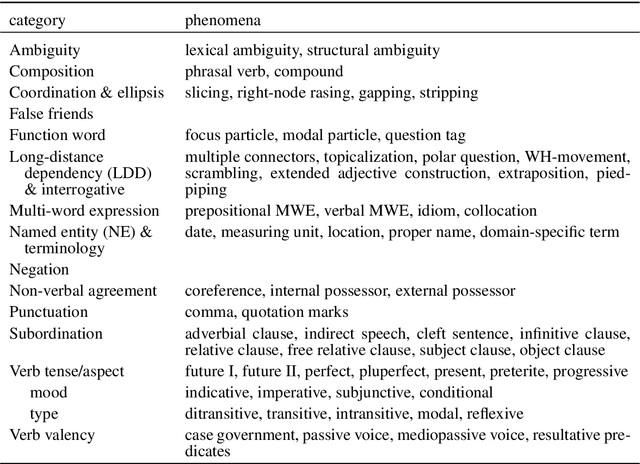
Abstract:We present an analysis of 16 state-of-the-art MT systems on German-English based on a linguistically-motivated test suite. The test suite has been devised manually by a team of language professionals in order to cover a broad variety of linguistic phenomena that MT often fails to translate properly. It contains 5,000 test sentences covering 106 linguistic phenomena in 14 categories, with an increased focus on verb tenses, aspects and moods. The MT outputs are evaluated in a semi-automatic way through regular expressions that focus only on the part of the sentence that is relevant to each phenomenon. Through our analysis, we are able to compare systems based on their performance on these categories. Additionally, we reveal strengths and weaknesses of particular systems and we identify grammatical phenomena where the overall performance of MT is relatively low.
Linguistic evaluation of German-English Machine Translation using a Test Suite
Oct 16, 2019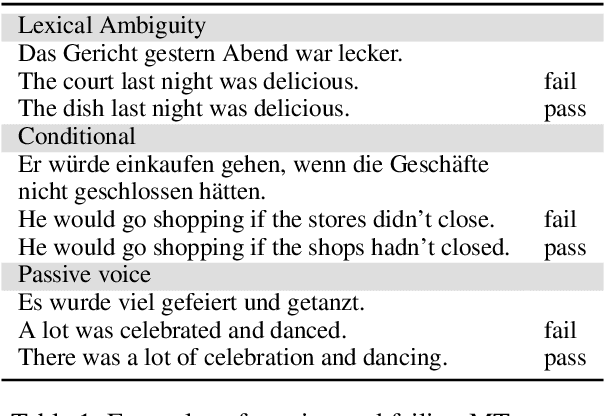

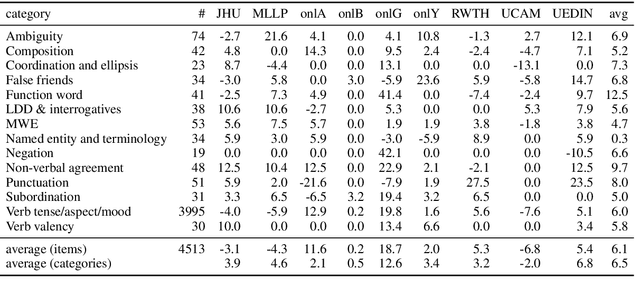
Abstract:We present the results of the application of a grammatical test suite for German$\rightarrow$English MT on the systems submitted at WMT19, with a detailed analysis for 107 phenomena organized in 14 categories. The systems still translate wrong one out of four test items in average. Low performance is indicated for idioms, modals, pseudo-clefts, multi-word expressions and verb valency. When compared to last year, there has been a improvement of function words, non-verbal agreement and punctuation. More detailed conclusions about particular systems and phenomena are also presented.
Creation of an Annotated Corpus of Spanish Radiology Reports
Oct 30, 2017

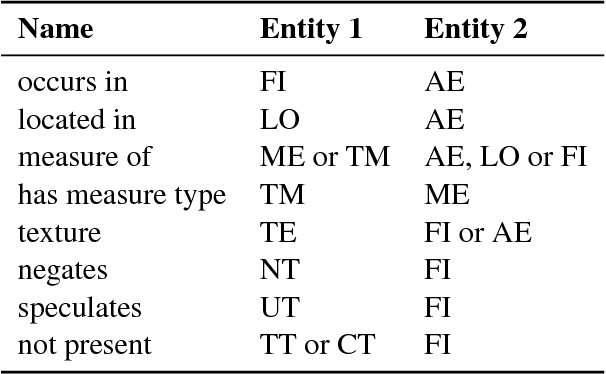

Abstract:This paper presents a new annotated corpus of 513 anonymized radiology reports written in Spanish. Reports were manually annotated with entities, negation and uncertainty terms and relations. The corpus was conceived as an evaluation resource for named entity recognition and relation extraction algorithms, and as input for the use of supervised methods. Biomedical annotated resources are scarce due to confidentiality issues and associated costs. This work provides some guidelines that could help other researchers to undertake similar tasks.
A Linguistically Interpreted Corpus of German Newspaper Text
Jul 17, 1998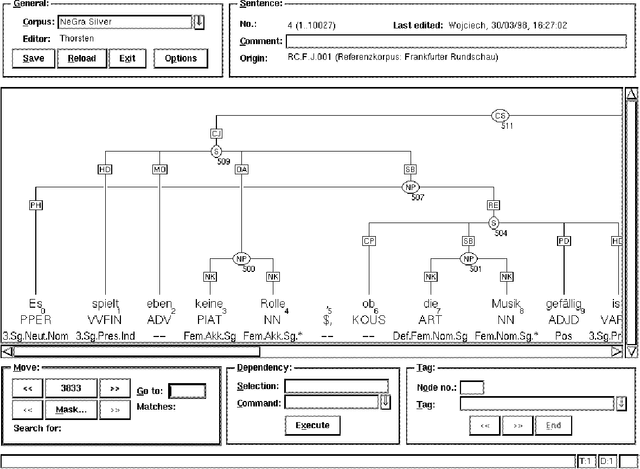

Abstract:In this paper, we report on the development of an annotation scheme and annotation tools for unrestricted German text. Our representation format is based on argument structure, but also permits the extraction of other kinds of representations. We discuss several methodological issues and the analysis of some phenomena. Additional focus is on the tools developed in our project and their applications.
An Annotation Scheme for Free Word Order Languages
Feb 10, 1997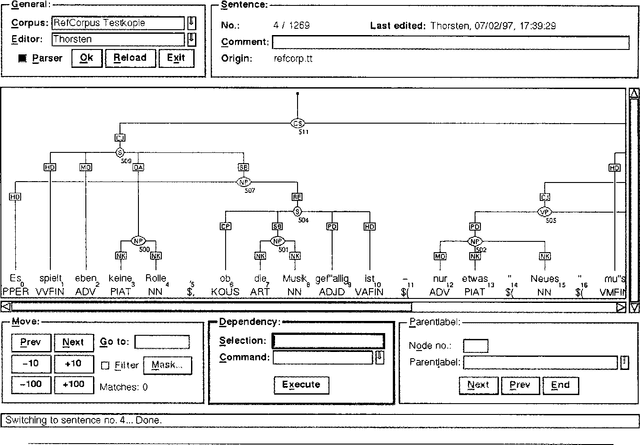
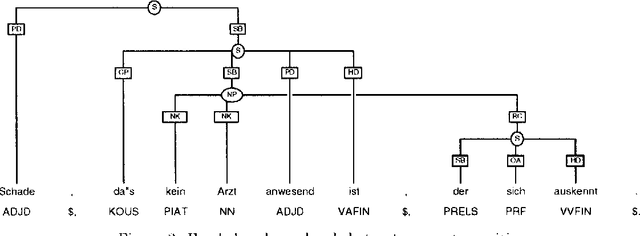

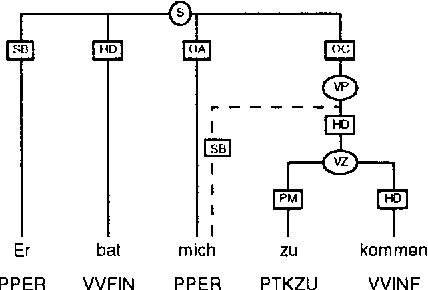
Abstract:We describe an annotation scheme and a tool developed for creating linguistically annotated corpora for non-configurational languages. Since the requirements for such a formalism differ from those posited for configurational languages, several features have been added, influencing the architecture of the scheme. The resulting scheme reflects a stratificational notion of language, and makes only minimal assumptions about the interrelation of the particular representational strata.
DISCO---An HPSG-based NLP System and its Application for Appointment Scheduling
Jun 30, 1994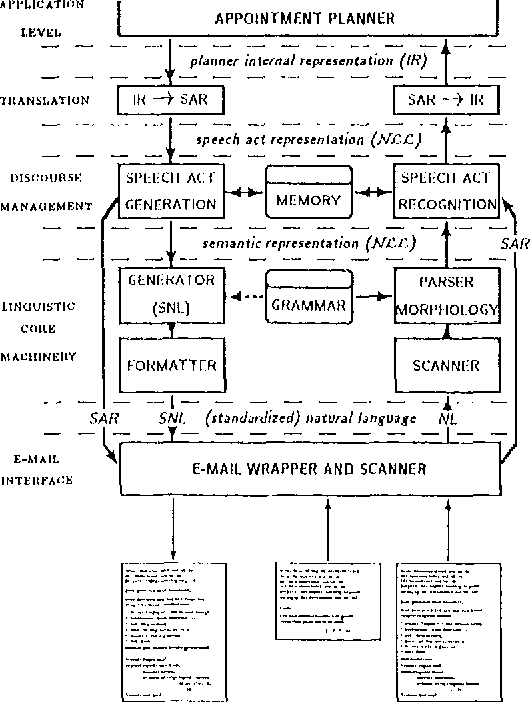
Abstract:The natural language system DISCO is described. It combines o a powerful and flexible grammar development system; o linguistic competence for German including morphology, syntax and semantics; o new methods for linguistic performance modelling on the basis of high-level competence grammars; o new methods for modelling multi-agent dialogue competence; o an interesting sample application for appointment scheduling and calendar management.
 Add to Chrome
Add to Chrome Add to Firefox
Add to Firefox Add to Edge
Add to Edge